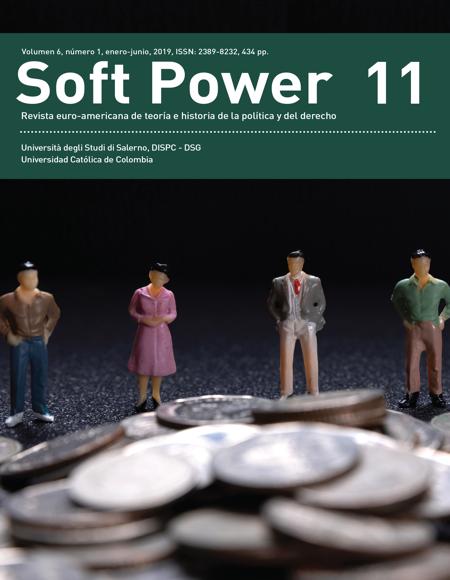Abstract
This paper analyses György Lukács’ interpretation of the concept of ‘class consciousness’ in the light of Slavoj Žižek’s reflections on ‘class struggle’. Against the widespread assumption that Western societies have entered in a ‘post-political’ era, this paper aims to highlight how the conflict between labour and capital is still relevant to understand the contemporary dynamics of globalized capitalism. Class struggle, it is argued, is inherent to the modern capitalist world. The process of acquisition of class consciousness by the proletariat, an essential element of class struggle, is however constantly hindered by hegemonic classes through the smokescreen of populism. Thus, Žižek’s approach to ‘class struggle’ is discussed as a potentially successful means to the construction of a new revolutionary subject.

References
Breger C. (2001). The Leader’s Two Bodies: Slavoj Žižek’s Postmodern Political Theology. Diacritics, 31(1), 73-90.
Congdon L. (2007). Apotheosizing the Party: Lukács’s “Chvostismus und Dialektik”. Studies in East European Thought, 59(4), 281-292.
De Kesel M. (2004). Act without Denial: Slavoj Žižek on Totalitarianism, Revolution and Political Act. Studies in East European Thought, 56(4). En The Many Faces of Slavoj Žižek’s Radicalism (299-334).
Denyer T. (1989). The Ethics of Struggle. Political Theory, 17(4), 535-549.
Feher F. and Heller A. (1983). Class, Democracy, Modernity. Theory and Society, 12(2), 211-244.
Furri F. (2016). “Can migrants act?”. Presenza, organizzazione, visibilità in un orizzonte precario. REMHU - Revista Interdisciplinar da Mobilidade Humana, 24(47), 11-26.
Gandesha S. (2018). Understanding Right and Left Populism. En J. Morelock (Ed.), Critical Theory and Authoritarian Populism, University of Westminster Press.
Lukács, G. (1923). Geschichte und Klassenbewusstsein. Studien über Marxistische Dialektik. München: Luchterhand Literaturverlag.
Marx, C. y Engels, F. (1845). Die heilige Familie, oder Kritik der kritischen Kritik.. Frankfurt am Main: Literarische Anstalt.
McLaren P. (2001). Slavoj Žižek’s Naked Politics: Opting for the Impossible, A Secondary Elaboration. A Journal of Composition Theory, 21(3), 613-647.
Moolenaar R. (2004). Slavoj Žižek and the Real Subject of Politics. Studies in East European Thought, 56(4), 259-297.
Mouffe, C. (2005). On the Political. London: Routledge.
Olson A. and Worsham L. (2001). Slavoj Žižek: Philosopher, Cultural Critic, and Cyber-Communist. A Journal of Composition Theory, 21(2), 251-286.
Papa F. (1990). Razionalizzazione distruttiva. Napoli: Guida Editori.
Rosenthal J. (1988). Who Practices Hegemony? Class Division and the Subject of Politics. Cultural Critique, (9), 25-52.
Schmitt, C. (1972). Le categorie del politico. Bologna: Il Mulino.
Sloterdijk, P. (2005). Im Weltinnenraum des Kapitals. Zu einer philosophischen Geschichte der terrestrischen Globalisierung. Frankfurt am Main: Suhrkamp.
Thoburn N. (2013). Do not be afraid, join us, come back? on the “idea of communism” in our time. Cultural Critique, 84, 1-34.
Trimbur J. (1999). The Problem of Post-Marxism: Radical Democracy and Class Struggle. A Journal of Composition Theory, 19(2), 285-291.
Welsh S. (2012). Coming to Terms with the Antagonism between Rhetorical Reflection and Political Agency. Philosophy & Rhetoric, 45(1), 1-23.
Žižek S. (1998). A Leftist Plea for “Eurocentrism”. Critical Inquiry, 24(4), 988-1009.
Žižek S. (2000). From History and Class Consciousness to the Dialectic of Enlightenment… and Back. New German Critique, (81), 107-123.
Žižek, S. (2000). Georg Lukacs as the philosopher of Leninism. En Lukács, G. et al. (2000). A defence of history and class consciousness: Tailism and the dialectic. London: Verso.
Žižek S. (2001). The Leader’s Two Bodies: Slavoj Žižek’s Postmodern Political Theology by Claudia Breger. Diacritics, 31(1), 91-104.
Žižek S. (2002). A Plea for Leninist Intolerance. Critical Inquiry, 28(2), 542-566.
Žižek S. (2004). The Ongoing “Soft Revolution”. Critical Inquiry, 30(2), 292-323.
Žižek S. (2006). Against the Populist Temptation. Critical Inquiry, 32(3), 551-574.
Žižek, S. (2016). La nueva lucha de clases. Los refugiados y el terror. Barcelona: Anagrama













